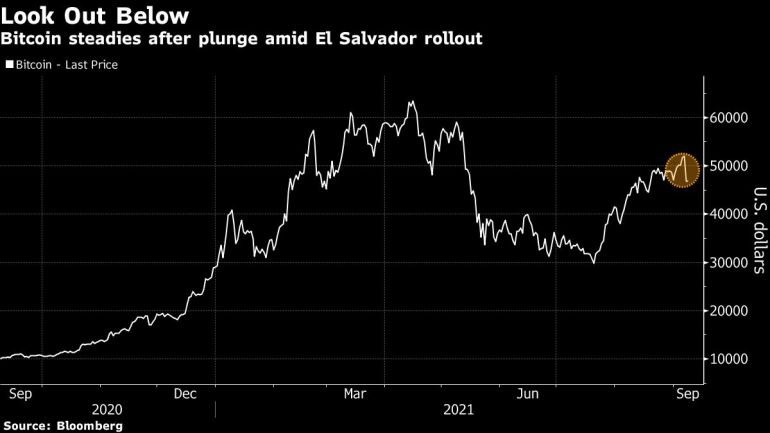El Salvador’s troubled cryptocurrency rollout hits Bitcoin
El Salvador’s crypto launch had a rocky start due to technical issues with its digital wallet that were later resolved.

Bitcoin nursed losses Wednesday after plunging amid El Salvador’s troubled rollout of the largest cryptocurrency as legal tender.
The virtual coin was trading at about $47,100 as of 11 a.m. in Singapore, having slid as much as 17% a day earlier before paring some of the losses. The downdraft also swept across tokens such as Ether and Dogecoin, as well as the Bloomberg Galaxy Crypto Index.
Keep reading
list of 4 itemsNayib Bukele: El Salvador’s Bitcoin messiah
El Salvador orders graft arrest of ex-President Sanchez Ceren
El Salvador court says presidents can serve two straight terms
“Social media platforms were very cautious over the weekend that a plunge could occur following El Salvador’s big day,” Edward Moya, senior market analyst at Oanda Corp., wrote in a note. Some investors likely bought in anticipation of the nation implementing its Bitcoin law Sept. 7 and then moved to “sell the fact,” he said.
El Salvador’s experiment with Bitcoin — the biggest test of the token’s real-world usefulness — had a rocky start because of technical glitches to the official digital wallet that later appeared to be resolved. President Nayib Bukele said on Twitter the country now holds 550 Bitcoins after buying when the price fell.

Tuesday’s selloff is the most significant break in a rebound that had lifted Bitcoin almost 75% since late July. Overall cryptocurrency market value fell about $280 billion in the past 24 hours, according to tracker CoinGecko.
Some $3.7 billion of cryptocurrency liquidations occurred over the same period, according to Bybt.com. These happen when leveraged positions are closed by exchanges for failing to meet margin requirements.
Billionaire Mike Novogratz, chief executive officer of Galaxy Digital Holdings and a long-time cryptocurrency bull, said the market for digital coins was running strong over the last eight weeks and became overbought. Interest from individual investors spiked on the back of large institutions jumping on board the cryptocurrency wagon, he said.
Oanda’s Moya argued that Bitcoin’s “fundamentals remain intact, as prices iron out a new trading range between the $46,000 and $53,000 levels.”
While the El Salvador rollout may have been a proximal cause of the swings in Bitcoin, other variables could also be at play in the famously volatile cryptocurrency sector. In particular, the prospect of reduced Federal Reserve stimulus is a challenge for speculative assets like digital tokens.
“Could it also be that the liquidity beneficiaries — which could include crypto — may be sensing more normalized future policy setting from major central banks,” Chris Weston, head of research at Pepperstone Financial Pty, wrote in a note.
Stocks in Asia tied to cryptocurrencies, such as Japan’s Monex Group, retreated. North American peers like Riot Blockchain Inc., Marathon Digital Holdings Inc., Coinbase Global Inc. and MicroStrategy Inc. also tumbled.